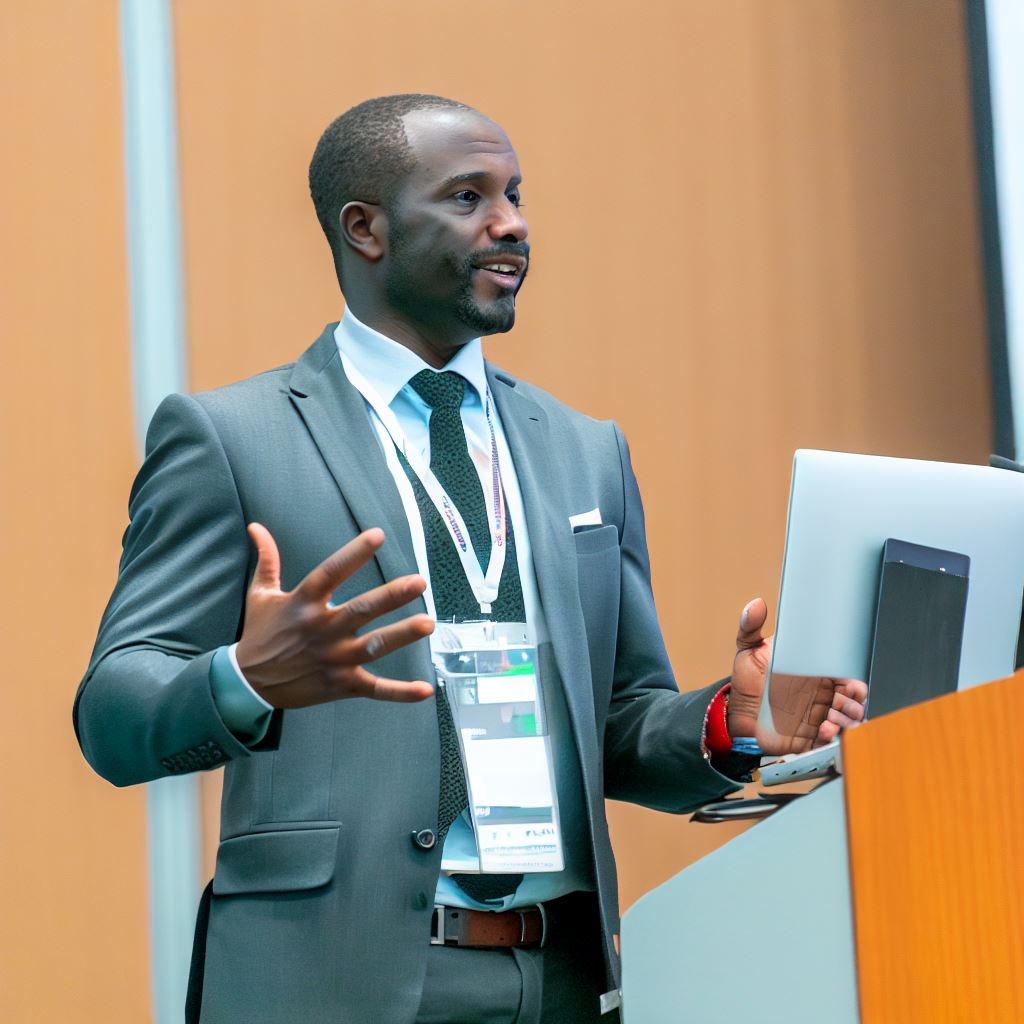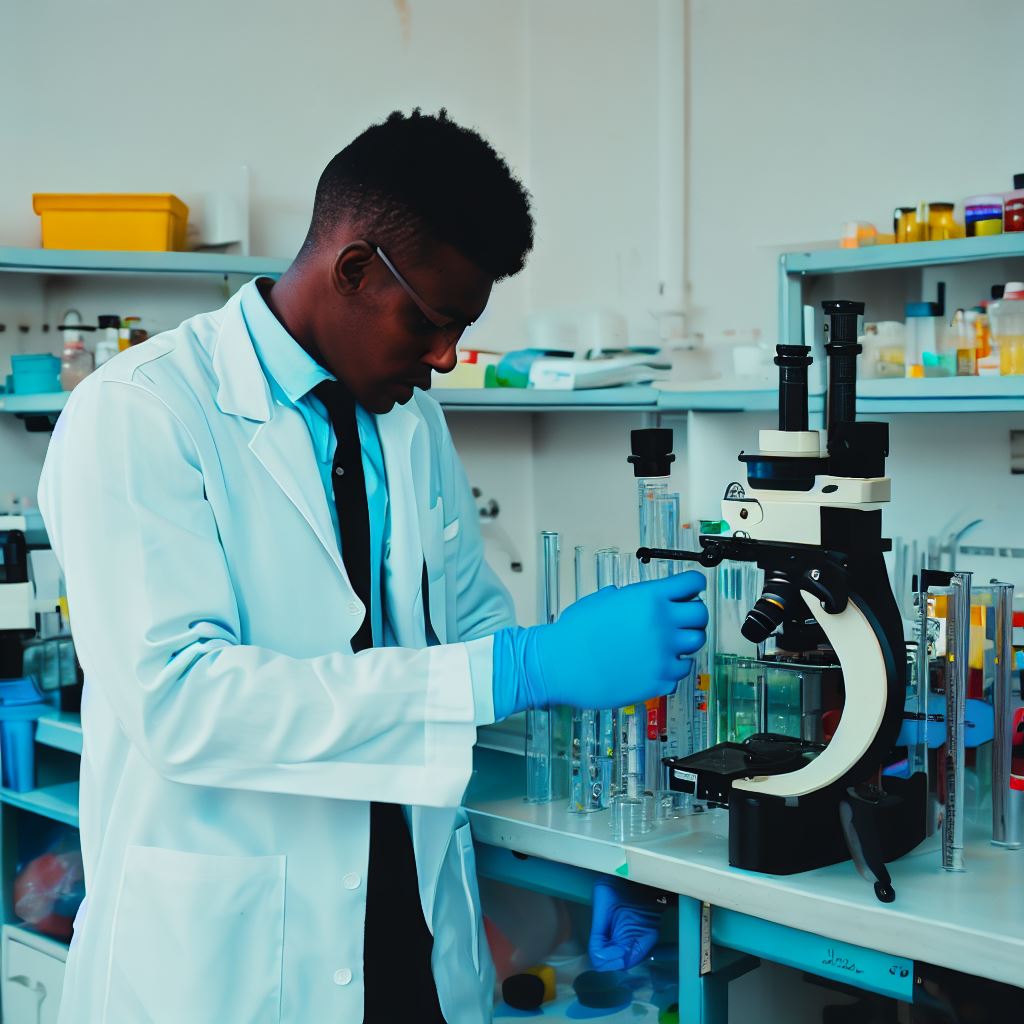Introduction
In the Nigeria Science Community, international collaborations entail partnerships between researchers and institutions from various countries.
These collaborations are crucial as they promote knowledge sharing, access to resources, and scientific advancements.
Nigeria’s science community is made up of various professionals, including scientists, engineers, and researchers.
They contribute to technological development, medical research, and environmental studies. Collaboration is vital for their progress.
Nigeria’s Science Community
A. Overview of Nigeria’s research institutions and universities
Nigeria is home to several research institutions and universities that play a crucial role in the country’s scientific development.
These institutions include the Nigerian Institute of Medical Research, National Institute for Pharmaceutical Research and Development, and the Nigerian Institute of Science Laboratory Technology.
Moreover, Nigeria has numerous universities that have dedicated research departments and faculties focused on various scientific disciplines.
Some of the notable universities in Nigeria known for their research contributions are the University of Ibadan, University of Lagos, and Obafemi Awolowo University.
B. Major scientific fields and areas of expertise in Nigeria
Nigeria’s science community covers a wide range of scientific fields and areas of expertise.
One of the significant areas of focus is agricultural research, where experts in Nigeria work towards improving farming techniques and developing drought-resistant crops.
Medical research is also a prominent field, with scientists studying diseases prevalent in Nigeria, such as malaria and sickle cell anemia.
The country also has a strong presence in the field of renewable energy, with scientists exploring solar and wind power solutions to address the country’s energy challenges.
Additionally, Nigeria’s science community is actively involved in environmental research, biodiversity conservation, and climate change studies.
C. Challenges faced by Nigeria’s science community
1. Lack of adequate funding and resources
One of the major challenges faced by Nigeria’s science community is the lack of sufficient funding and resources.
Many research institutions and universities struggle to acquire the necessary equipment and materials needed to conduct quality research.
This results in a significant setback for scientific progress, as researchers are unable to perform experiments or gather essential data.
2. Brain drain and talent retention
Nigeria’s science community also faces the issue of brain drain, where talented scientists and researchers leave the country in search of better opportunities abroad.
The lack of competitive salaries, limited career growth prospects, and unfavorable research environments contribute to this problem.
Retaining skilled professionals is essential for the sustained growth and advancement of Nigeria’s science community.
3. Limited research infrastructure and technology
An additional challenge is the limited availability of research infrastructure and technology.
Many institutions lack the necessary facilities and equipment to support advanced scientific research.
This hampers the ability of scientists to stay at the forefront of their respective fields and collaborate effectively with international partners.
Investments in research infrastructure and technology are crucial to overcoming this challenge and fostering international collaborations.
Nigeria’s science community comprises various research institutions and universities with expertise in diverse scientific fields.
However, the community faces significant challenges such as inadequate funding, brain drain, and limited research infrastructure.
Addressing these challenges is crucial to strengthen Nigeria’s scientific capabilities and promote effective international collaborations.
Read: Hydrologist Salary and Benefits: A Look at Nigeria’s Scene
International Collaborations in Nigeria
A. Overview of international collaborations involving Nigeria’s science community
The science community in Nigeria actively engages in international collaborations to enhance its research capabilities and contribute to global scientific progress.
These collaborations involve partnerships with foreign universities, research institutions, and participation in international research projects and programs.
B. Benefits of international collaborations
International collaborations bring numerous benefits to Nigeria’s science community, including:
1. Knowledge sharing and capacity building
Collaborating with international partners allows Nigerian scientists to exchange ideas, expertise, and technologies, enhancing their knowledge and skills in various scientific disciplines.
2. Access to funding and resources
International collaborations provide Nigerian scientists with opportunities to access external funding sources and resources that may not be readily available domestically.
This enables them to conduct high-quality research with adequate support.
3. Enhancing the quality and impact of research
Collaborations with international experts help Nigerian scientists improve the quality of their research through peer review and constructive feedback.
This enhances the credibility and impact of their work, leading to broader recognition and increased opportunities for collaboration.
C. Examples of successful international collaborations involving Nigeria
Nigeria has witnessed several successful international collaborations in its science community, fostering scientific advancements and addressing various societal challenges.
Some notable examples include:
1. Partnership with foreign universities and research institutions
Nigerian universities and research institutions have established fruitful partnerships with renowned international counterparts.
For instance, the University of Lagos collaborates with the Massachusetts Institute of Technology (MIT) on renewable energy research, leveraging MIT’s expertise and resources to develop sustainable solutions for Nigeria’s energy needs.
2. Participation in international research projects and programs
Nigerian scientists actively engage in international research projects and programs, contributing their expertise and leveraging global resources.
The Nigerian Institute of Medical Research collaborates with the World Health Organization (WHO) and other international partners to conduct research on infectious diseases such as malaria, HIV/AIDS, and Ebola, aiming to develop effective strategies for prevention and treatment.
International collaborations play a vital role in Nigeria’s science community by promoting knowledge sharing, providing access to funding and resources, and enhancing the quality and impact of research.
Through partnerships with foreign institutions and active participation in international projects, Nigeria’s scientists contribute to global scientific advancements while addressing local challenges.
These collaborations pave the way for a more inclusive and collaborative scientific landscape, benefiting both Nigeria and the international scientific community.
Read: Funding Opportunities for Scientists in Nigeria

Challenges and Opportunities
A. Challenges faced by Nigeria’s science community in establishing international collaborations
- Cultural differences and language barriers.
- Administrative hurdles and bureaucratic processes.
- Unequal power dynamics in collaborations.
B. Opportunities for enhancing international collaborations in Nigeria
Nigeria’s science community faces challenges in international collaborations, including cultural differences, bureaucratic hurdles, and unequal power dynamics. To overcome these obstacles and harness opportunities:
- Address language disparities and cultural nuances.
- Streamline administrative processes and reduce paperwork.
- Promote government funding, grants, and incentives.
- Enhance research infrastructure and capabilities.
- Facilitate conferences, workshops, and exchange programs.
These steps will enable Nigerian scientists to establish successful international collaborations, contributing to global scientific progress.
Read: The Demand for Hydrologists in Nigeria: A Comprehensive Study
Discover More: Innovations by Nigerian Biochemists: A Review
Case Study: Successful International Collaboration
A. Example of a successful international collaboration in Nigeria’s science community
- Background of the collaboration and its objectives: In 2015, the Nigerian Institute of Medical Research (NIMR) partnered with the Centers for Disease Control and Prevention (CDC) to combat the Ebola virus outbreak in Nigeria.
- Achievements and impact: This collaboration proved to be highly successful, as Nigeria was able to contain and ultimately eradicate the Ebola virus within a short period of time.
The joint efforts led to quick identification of cases, contact tracing, and effective implementation of control measures. - Lessons learned and best practices: The collaboration highlighted the importance of rapid response, effective communication, and coordination between international partners and local authorities.
It emphasized the need for capacity building in disease surveillance and laboratory diagnostics, which resulted in improved preparedness and response to future outbreaks.
1. Background of the collaboration and its objectives
In 2014, the Ebola virus outbreak shook West Africa, causing immense devastation in Guinea, Liberia, and Sierra Leone.
The threat of the virus spreading to Nigeria, a densely populated country with weak healthcare systems, was alarming.
However, the collaboration between NIMR and CDC helped prevent a major outbreak in Nigeria.
The primary objective of this collaboration was to provide technical assistance, expertise, and resources to strengthen Nigeria’s capacity to detect, diagnose, and respond to the Ebola virus.
The partnership aimed to support surveillance systems, establish laboratory capacity, and enhance training to healthcare workers.
2. Achievements and impact
The collaboration between NIMR and CDC yielded significant achievements and had a tremendous impact on Nigeria’s ability to control the Ebola outbreak.
The joint effort led to the following outcomes:
- Rapid containment: The collaborative response led to the early identification and isolation of Ebola cases, preventing the further transmission of the virus within the country. This swift action reduced the risk of a widespread outbreak and saved numerous lives.
- Enhanced laboratory diagnostics: The CDC supported NIMR in establishing state-of-the-art diagnostic capabilities for Ebola virus disease.
This enabled faster and more accurate diagnosis, allowing for prompt medical care and appropriate isolation measures. - Increase in public awareness: Through the collaboration, public awareness campaigns were launched to educate Nigerians about Ebola prevention, symptoms, and precautionary measures.
This proactive approach helped minimize panic and misinformation, fostering a sense of trust and cooperation among the public. - Strengthened surveillance systems: The partnership contributed to strengthening Nigeria’s disease surveillance systems, ensuring early detection and timely response to potential outbreaks.
This not only benefitted the Ebola response but also improved Nigeria’s overall public health infrastructure.
3. Lessons learned and best practices
The successful collaboration between NIMR and CDC offers valuable lessons and best practices for future international partnerships:
- Coordination and communication: Effective coordination and regular communication channels between international and local partners are critical for swift response and resource mobilization during health emergencies.
- Proactive preparedness: Investing in capacity building for disease surveillance, laboratory diagnostics, and public health infrastructure is crucial for preparedness in tackling future outbreaks.
- Community engagement: Engaging communities through public awareness campaigns not only helps in dispelling myths and misinformation but also builds trust, ensuring cooperation during health emergencies.
- Mutual learning: International collaborations provide opportunities for knowledge exchange, promoting the sharing of best practices, and enabling mutual learning for all partners involved.
The successful collaboration between NIMR and CDC during the Ebola outbreak in Nigeria exemplifies the positive impact of international partnerships in the country’s science community.
Through this case study, valuable lessons have been learned, emphasizing the significance of coordination, capacity building, and community engagement in combating infectious diseases.
Such collaborations serve as pillars for strengthening Nigeria’s healthcare systems and fostering global health security.
Read: Top Universities for Hydrology Studies in Nigeria: A Guide
Explore Further: Nigeria’s Top Mapping Projects: A Cartographer’s View
Conclusion
A. Importance of International Collaborations
In Nigeria’s science community, international collaborations are a catalyst for progress.
They bring fresh perspectives, expertise, and resources, accelerating research and development.
B. Challenges and Opportunities
Despite hurdles like funding and bureaucracy, the opportunities are immense.
Shared knowledge, technology transfer, and global exposure can propel Nigeria’s scientific endeavors.
C. Encouragement for Participation
Let’s champion international collaborations.
Researchers, policymakers, and institutions must actively engage in partnerships, fostering innovation and addressing global challenges.
Nigeria’s science community, united with the world, can achieve remarkable feats.




